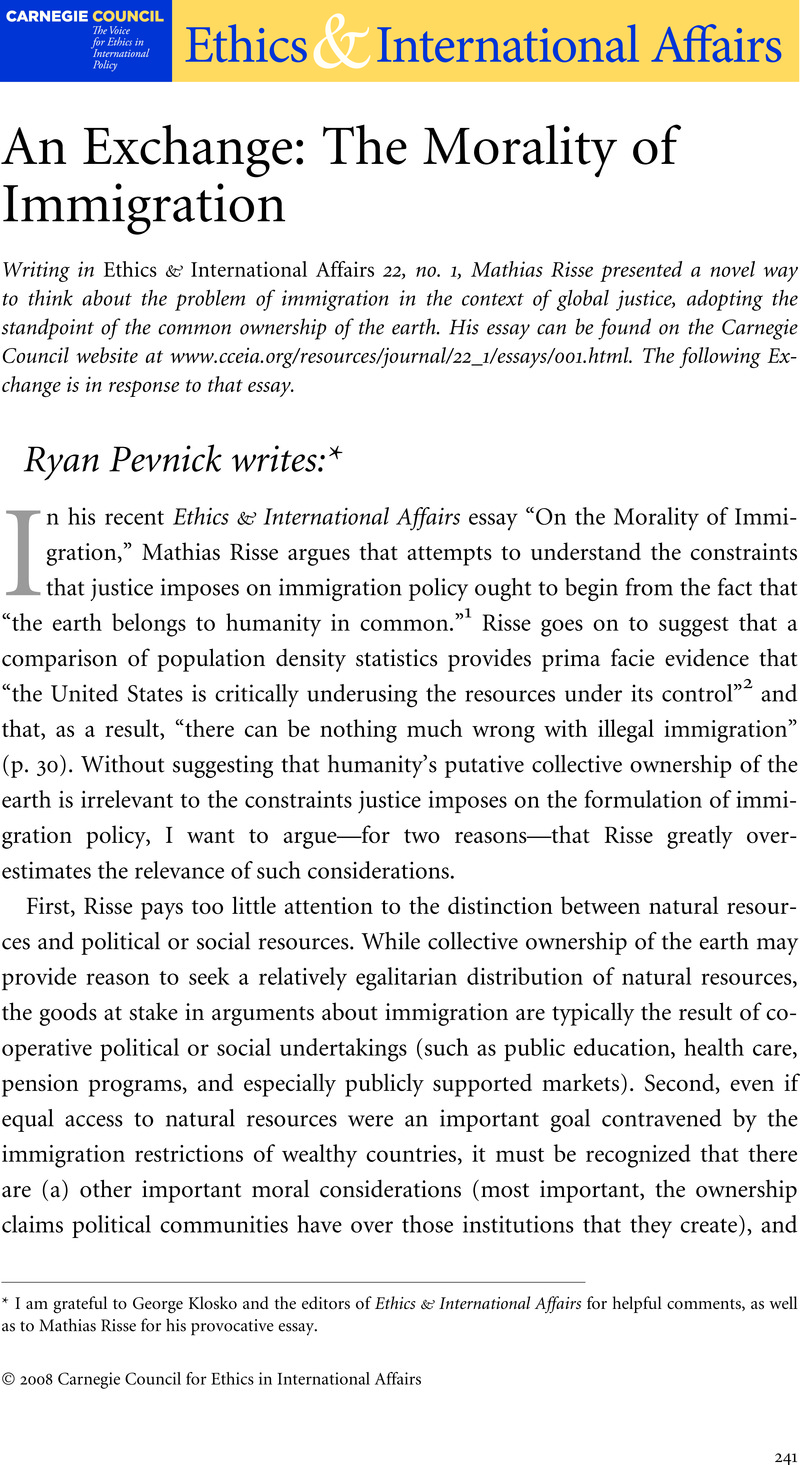Article contents
An Exchange: The Morality of Immigration: Ryan Pevnick writes:*
Published online by Cambridge University Press: 25 March 2011
Abstract

- Type
- An Exchange
- Information
- Copyright
- Copyright © Carnegie Council for Ethics in International Affairs 2008
References
NOTES
1 Mathias Risse, “On the Morality of Immigration,” Ethics & International Affairs 22, no. 1 (Spring 2008), p. 25. All further references to this article will be parenthetical in-text page references, e.g., (p. XX).
2 Underuse of resources is not, I think, a charge Americans are accustomed to answering.
3 For a warning of the risks of using far-flung examples in political theory, see Robert E. Goodin, Political Theory and Public Policy(Chicago: University of Chicago Press, 1983).
4 Indeed, quite the contrary: over half of Sierra Leone's tertiary educated population now lives in OECD countries, thus fleeing resource-rich territory for politically developed areas (Devesh Kapur and John McHale, “Should a Cosmopolitan Worry about the ‘Brain Drain’?” Ethics & International Affairs 20, no. 3 [Fall 2006], p. 307).
5 The entrance of poor individuals presents a particular challenge to sustaining programs of mutual benefit at current levels for the obvious reason that such programs pool and share the resources of participants: more poor participants means fewer resources per participant.
6 The changes to the example allow us to take into account the relevance of programs of mutual benefit. However, the fact that the example reduces the number of cooperators to two makes it difficult to mirror the situation precisely, in that it will be hard for two individuals to provide the excludable public goods typically provided by states. I discuss how the presence of these goods further complicates the scenario in the next section.
7 The extent to which this is true depends also on the connection between the use of such resources and the depletion of the earth as a livable environment. Indeed, Risse's position raises difficult environmental and population-related issues, but I will leave those to the side.
8 The idea that we can measure the use of natural resources via straightforward reference to population density is (as Risse allows) obviously fraught with difficulty, but I will leave the measurement issues to the side in order to focus on prior conceptual difficulties with the proposal.
9 A range of limitations ought to be recognized on the claims of citizens to the goods created by the political community. For example, limitations may be imposed by the basic human rights of outsiders or restrictions on the way in which such goods may permissibly be produced. An exploration of such limits is, however, beyond the scope of this essay.
10 See Thomas Pogge, World Poverty and Human Rights(Cambridge: Polity, 2002).
11 As Risse notes (pp. 27–28), it should be obvious that the distinction is not always a neat one; there will be times when we will have to argue about which group goods fit into. That said, the basic distinction and its relevance to immigration policy should be clear even without more precise categories.
12 Mathias Risse, “How Does the Global Order Harm the Poor?” Philosophy & Public Affairs 33, no. 4 (2005), p. 355.
13 It remains possible that it is strength in natural resources that allows for the successful construction of the relevant institutions, but establishing this requires extensive and as yet unprovided empirical evidence.
14 See, e.g., Paul Collier, The Bottom Billion(New York: Oxford University Press, 2007). Even those who reject this line of argument often suggest that economic development hinges on sociological or institutional factors rather than ecological ones (Andrew Schrank, “Reconsidering the ‘Resource Curse’: Sociological Analysis versus Ecological Determinism” [unpublished paper]). Thus, there is little empirical support for a straightforward causal link between wealth in natural resources and political development.
- 10
- Cited by


